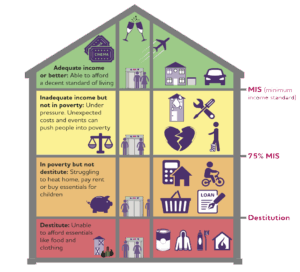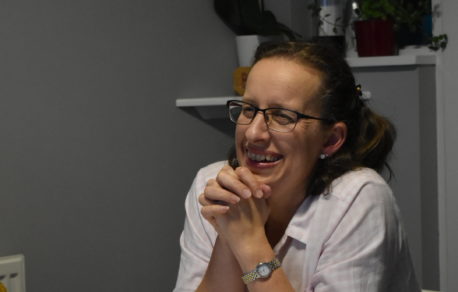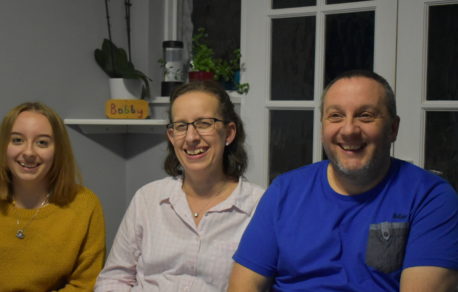
Blog: Mysteries of MIS (Minimum Income Standard) unravelled
Have you ever seen the phrase ‘Minimum Income Standard’ and wondered what it was all about? Or how it plays a role in the support that Foothold provides?
Hopefully I can shed a little light on the matter.
Research into a Minimum Income Standard (MIS) for Britain was originally funded in 2006 by the Joseph Rowntree Foundation. It was carried out in partnership with the Centre for Research in Social Policy (CRSP) at Loughborough University and the Family Budget Unit at the University of York.
CRSP now solely carries out the research and updates the MIS figures each year.
So, what’s MIS?
MIS represents the income a household needs for ‘a minimum standard of living’ in Britain today.
While this covers food, clothes and shelter, it’s also about having opportunities and choices to participate in society. So, it’s not a direct comparison with the accepted definition of poverty within the UK (a household income below 60% of the median after housing costs for that year).
How is MIS calculated?
Uniquely, the MIS is decided by focus groups made up of members of the public. The focus groups are asked to imagine they’re in people’s homes and describe what items they need for everyday life.
Experts check the results to make sure they meet standards in areas such as nutrition and fuel consumption. They’re then approved by final ‘check-back’ groups of members of the public.
How does Foothold use MIS?
Foothold has been working to relive poverty since our foundation in 1890. A key part of our work is providing grants to individuals and families. Since 2008, we’ve used MIS as a reference point to guide our decision making on grants.
In 2019, we reviewed our strategy, and felt that MIS was still the best framework to guide our grant giving. This is because MIS is:
- Defined by members of the public and aligned with expert knowledge
- Updated every year
- Applicable to households of all different shapes and sizes.
Strikingly, research published by the Joseph Rowntree Foundation showed that people earning below 75% of MIS face a far higher likelihood of deprivation than those whose incomes are above the MIS threshold.

Source: Joseph Rowntree Foundation – Full Report UK poverty: Causes costs and solutions
And so, we focused in on that tipping point where income adequacy disappears: 75%.
We began to look at how we could uplift eligible community members to 75% of the MIS threshold, through a system of tailored financial awards. As we thought about this, we decided that we also needed to consider one-off support to help people manage unexpected costs.
In doing so, we hoped to move all members of our community closer to achieving a socially acceptable standard of living.
We decided to use the headline MIS figures, which don’t include housing or childcare costs. Not all of our community members have housing or childcare needs. So instead, we chose to provide for those separately in our grant calculations.
To solidify the commitment, we included an objective based on MIS in our 2019-22 and 2022-27 strategies:
“Enable our community to participate in a socially inclusive lifestyle by achieving a household income of 75% of the headline MIS level for eligible community members”
What progress has Foothold made since 2019?
At the start of our last financial year (July 2024), we were able to lift community members’ incomes to 60% of the headline MIS level, through ongoing grants.
In December 2024, we were able to uplift the grants to align with the 2024 MIS and increase our contribution to 63%.
Our goal this year is to again match the potential uplifts to the MIS levels, which will be published in autumn 2025. We hope to increase our grants to meet 65% of the published figures.
Does MIS only apply to people in the UK?
Although the MIS methodology was first used in the UK, it has been applied in France, Ireland, Japan and Portugal. Pilot studies are being carried out in Mexico, Thailand, South Africa and Singapore. This has helped us develop our insights into costs of living outside the UK.
Based on work by the Chemists’ Community Fund, we were able to implement an Overseas Calculator in 2021. This lets us model our grants using calculations based on factors such as the cost of a basket of goods and the country’s gross domestic product (GDP).
With these insights, we can provide grants tailored to the country a person is living in. It’s an important tool for us to support our community, which currently ranges across 53 countries.
Evidence-based support for the community
MIS has given us an objective view of the financial needs of UK households, as well as a way to calculate grants for households outside the UK.
Working within this clear, research-based framework helps us to make sure grant assessments are free from bias.
Since 2024, we’ve used MIS to calculate eligibility for other support too, such as counselling and care and disability grants. This ensures our support goes to those community members who need it most.
Transparency in grant making: 360 Giving
Earlier this year, we were excited to publish our first set of data on our grant giving on the 360 Giving platform. The platform helps organisations to publish and use open, standardised grants data to improve charitable giving.
You can see the details of our UK grants here. 360 Giving hopes to be able to publish details of our overseas grants in future (they’re currently recorded as ‘undetermined country and region’).
I hope this has given you some insight into the Minimum Income Standard and how and why we use it to guide our grant making.
For more insights into poverty in the UK and the MIS, see:
- Joseph Rowntree Foundation
- Centre For research in Social Policy, Loughborough University




